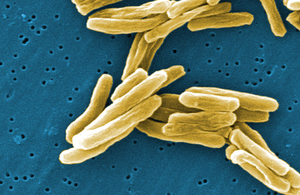BCG vaccine prevents TB infection in children
PHE research finds BCG vaccine offers further protection against TB.

Tuberculosis (TB)
A new study from Public Health England (PHE) published in the British Medical Journal today (6 August 2014) has found Bacillus Calmette-Guérin (BCG) vaccine may protect against M. tuberculosis (TB) infection, in addition to decreasing progression of TB from infection to disease.
Prior to this review, it has been widely accepted that BCG vaccine protects against the most severe forms of disease such as tuberculosis (TB) meningitis in children. This review of existing research indicates BCG vaccine can also protect against an individual becoming infected.
The meta-analysis of 14 studies involving 3,855 participants found that BCG vaccinated children were less likely than unvaccinated children to have evidence of TB infection after exposure. Interferon–gamma release assays (IGRA), which can detect M. tuberculosis infection and discriminate this from prior BCG vaccination, made this analysis possible. Previously skin tests weren’t able to distinguish between TB infection, infection from non TB mycobacterium and the presence of BCG vaccine, which made it impossible to determine if someone who had received the vaccine had been protected against getting TB infection.
Dr Anjana Roy, Senior Scientist for Public Health England and lead study author said:
These results suggest a significant shift in our understanding of how anti mycobacterial vaccines work, and could indicate that not only does BCG vaccine protects against developing active TB disease, but that it also protects against getting infected.
This finding will have implications for the use of BCG in current immunisation programmes as well as in the future development of new improved tuberculosis vaccines. It reinforces the recommendation that BCG should be given as soon as possible after birth to prevent children from getting infected.
In 2012, there were 8,130 cases of TB reported in England, which is an incidence of 15 cases per 100,000 of the population. England now has the second highest TB rate in Western Europe and if current trends continue, will have more TB cases than the whole of the US within 2 years.
Professor Ibrahim Abubakar, Head of TB at Public Health England and Professor of Infectious Disease Epidemiology at University College London (UCL), said:
TB remains a critical public health problem, particularly in parts of London and among people from vulnerable communities. The implications of this study are particularly pertinent for these populations where we need to ensure that infants are promptly vaccinated after birth.
TB is one of the key priorities for PHE and we are working with key partners to oversee the development of a stronger national approach to TB control, including screening and vaccination.
Notes to editors
- ‘Effect of BCG Vaccination against Mycobacterium tuberculosis infection in Children: A Systematic Review and meta-analysis’ is available on the BMJ website
- The main recommendations for routine BCG vaccination of children are now: infants (aged 0 to 12 months) living in areas with a high incidence of TB (40 out of 100,000 or greater), and any children with a parent or grandparent born in a high incidence country.
- TB is an infection caused by bacteria. It usually affects the lungs, but can affect other parts of the body. TB is transmitted when someone who has the infection coughs or sneezes, but it requires close prolonged contact in order to spread from person to person. For more information about tuberculosis visit PHE’s dedicated web pages
- This study was a collaboration between scientists at PHE, NHS, Imperial College, London School of Hygiene and Tropical Medicine and UCL.